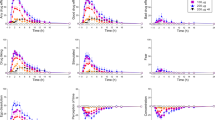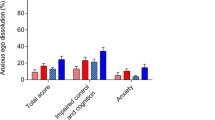Abstract
IN a communication on lysergic acid diethylamide, Axelrod, Brady, Witkop and Evarts1 state: “Although the hallucinogenic agent, lysergic acid diethylamide, has been the subject of numerous investigations, little is known about its biological fate”. However, a number of facts, not mentioned in this communication, about the destruction, distribution and excretion of this compound have recently been published which show that we are not quite as ignorant about the biological fate of this compound as one might infer from this statement.
This is a preview of subscription content, access via your institution
Access options
Subscribe to this journal
Receive 51 print issues and online access
$199.00 per year
only $3.90 per issue
Buy this article
- Purchase on Springer Link
- Instant access to full article PDF
Prices may be subject to local taxes which are calculated during checkout
Similar content being viewed by others
References
Axelrod, J., Brady, R. O., Witkop, B., and Evarts, E. V., Nature, 178, 143 (1956).
Lanz, U., Cerletti, A., and Rothlin, E., Helv. Physiol. Acta, 13, 207 (1955).
Boyd, E. S., Rothlin, E., Bonner, J. F., Slater, J. H., and Hodge, H. C., J. Pharmacol., 113, 6 (1955).
Stoll, A., Rothlin, E., Rutschmann, J., and Schalch, W. A., Experientia, 11, 396 (1955).
Author information
Authors and Affiliations
Rights and permissions
About this article
Cite this article
ROTHLIN, E. Metabolism of Lysergic Acid Diethylamide. Nature 178, 1400–1401 (1956). https://doi.org/10.1038/1781400a0
Issue Date:
DOI: https://doi.org/10.1038/1781400a0
Comments
By submitting a comment you agree to abide by our Terms and Community Guidelines. If you find something abusive or that does not comply with our terms or guidelines please flag it as inappropriate.



